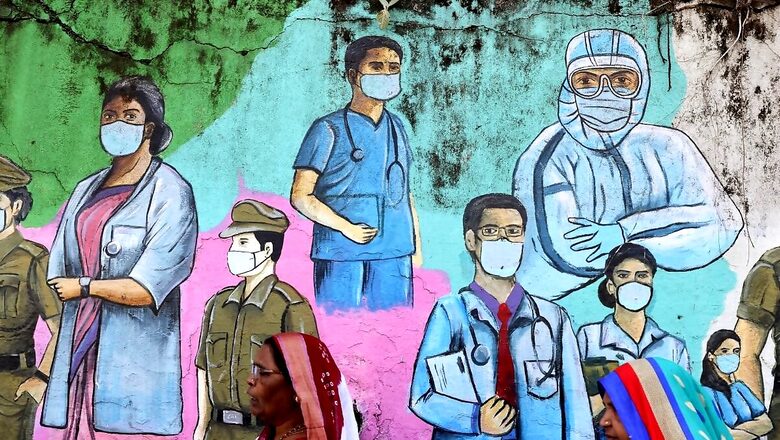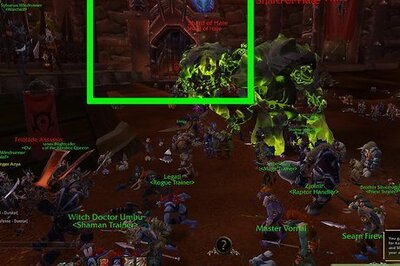
views
Covid-19 cases are witnessing a spike in several states across India. The country on Friday reported 3,095 fresh infections in 24 hours, with states like Maharashtra, Karnataka, Gujarat, Delhi, Kerala, and Tamil Nadu being among the highest contributors.
This time, it seems that XBB.1.16, the new Omicron variant has become a cause of concern for the authorities, especially in Delhi and Maharashtra. First detected in Pune in February this year, XBB.1.16 is said to be fast replacing the other dominant strains in the country.
Addressing the press conference on Friday, Arvind Kejriwal said that XBB.1.16 ‘spreads fast and evades vaccine’ but is ‘not severe’.
As per the data, XBB.1.16 accounts for over 30 per cent of all the sequenced genomes in March 2023, with its proportion increasing rapidly in the past few weeks.
What is XBB.1.16 lineage of SARS-CoV-2?
XBB.1.16 was first detected in SARS-CoV-2 sequences from India, A recombinant lineage of Covid, XBB.1.16 is a descendent of the XBB lineage. The preliminary data on the virus suggest that XBB.1.16 has a higher growth advantage over other SARS-CoV-2 lineages that are currently circulating including the XBB.1.5 lineage.
“The XBB 1.16 subvariant is a highly transmissible variant with high infectivity rate. The subvariant has mutations on the amino acids and nucleotide space that gives it the capacity to escape hybrid immunity achieved by vaccination and previous exposure to the virus,” Dr Charu Dutt Arora, Infectious Disease Specialist, Consultant Physician, AmeriHealth, Asian Hospital told Hindustan Times.
Symptoms of XBB.1.16 lineage
The signs and symptoms of the XBB.1.16 variant are very similar to that of the Omicron variant, which includes a high-grade fever for over 48 hours, cough, sore throat, body pain, severe headache, cold and abdominal discomfort.
“There is no loss of smell or taste seen in the patients, so far. Most of them have mild to moderate disease and are being managed on home isolation,” according to Dr Arora.
According to Dr Anurag Saxena, HOD- Internal Medicine, Primus Super Speciality Hospital, New Delhi, the XBB.1.16 version does not appear to be seriously harming people right now.
“Upper respiratory symptoms like a blocked nose, headache, sore throat, fever, and myalgia, or muscular discomfort that lasts for three to four days, are typical,” says Dr Saxena said, according to a report by HT.
In the case of lower respiratory tract infection, symptoms may include severe bronchitis and cough.
The experts recommended getting tested for COVID-19 if someone experiences these symptoms.
Who are the at-risk populations?
As per experts, the population that is at most risks of the new variant include the elderly population, children and people with co-morbidities such as cardiac conditions, previous pulmonary issues, and diabetes among other ailments.
Covid-19 becoming a seasonal illness?
According to Dr Atul Gogia, Internal Medicine, Sir Ganga Ram Hospital, we are heading in the direction where Covid-19 is becoming a seasonal illness.
“For now, Covid-19 hasn’t decided on a season unlike seasonal flu has (India sees two flu peaks in a year – January through March and August through October). But it keeps happening every few months,” Dr Gogia told Indian Express.
He said Covid will be one of the viruses that we just have to live with, that keeps coming and going, with a spike in cases from time to time.
He advised people to watch the trends and follow precautions like masking, practising hand hygiene and getting vaccine shots.
Are Booster Doses Needed?
The experts advised people to definitely get their first two shots of the Covid-19 vaccine. However, they said the booster dose is not that important at the moment.
So, if you talk about the Covid-19 cases at present, I cannot tell you whether it is vaccinated or unvaccinated that are getting more severe symptoms – the number of cases is still too small right now. Anyway, almost everyone has had their first two shots.
“The booster dose coverage is low but I don’t think it is very important at the moment. All of us have had at least one or two clinical or sub-clinical Covid-19 infections – some of us more than two times – and this seems to be protecting most people against severe disease,” said Dr Gogia.
Read all the Latest Explainers here



















Comments
0 comment